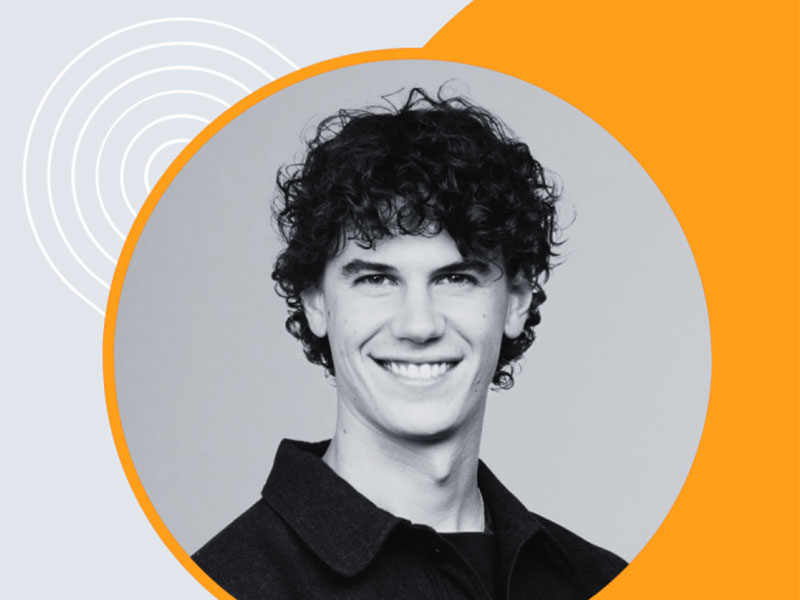Andrea Zanon, Prospinity
Curated by VSM Alumni, April 2025

From a Management degree in Venice to the Silicon Valley - the journey of a young entrepreneur driving fintech innovation
Andrea Zanon is a young entrepreneur from Venice who is already making his mark in the innovation landscape. He is the co-founder of Prospinity, a fintech startup based in Silicon Valley that recently closed a $2 million funding round. Andrea has built an outstanding academic and professional path. Valedictorian of the Economics and Management programme in Venice, he continued his studies at prestigious institutions such as the University of St. Gallen and the Chicago Booth School of Business, enriching his education with experiences at global companies like Google. Alongside this, he founded a YouTube channel with over 16,000 subscribers and Polo, a platform dedicated to career guidance for university students.
In this interview, Andrea shares the origins of Prospinity, his approach to entrepreneurship, and the crucial role that universities can play in nurturing the talent and vision of the next generation.
Andrea, how did the idea for Prospinity come about, and when did you realize it could become a real startup?
The idea for Prospinity came from an informal pact between Sam and Aarya, two of my co-founders, who were roommates at Yale. One night, while talking about their futures, Aarya looked at Sam and said: “If I ever make a billion dollars, I’ll give you 10%. And if you do, you’ll do the same for me. That way, only one of us has to make it.”
That was the spark: why not extend that pact to other talented students and create a way to invest in the human capital of people you believe in? That’s when I joined, and we started building something more structured.
We quickly realized that the concept had strong economic foundations. A career is arguably the most important asset each of us possesses—yet there’s no way to diversify it. In a world increasingly shaped by uncertainty, especially with the rise of AI, betting on the collective success of a carefully selected group of people makes deep sense—both human and strategic.
The first people we shared the idea with were some very prominent professors, including recent Nobel laureate Daron Acemoglu and Steven Levitt. They became our first advisors. Then came our first investment: $100,000 from Patrick Chung, which allowed us to build the legal and tech infrastructure to launch the first “success pools.”
Today, following our latest $2 million funding round, we’re ready to bring Prospinity to top U.S. universities.
What did your studies in Management at Ca’ Foscari teach you, and how did they influence your entrepreneurial experience?
As I said during my valedictorian speech at graduation, I think of university as a big buffet: it offers many resources and experiences, but it’s up to you to serve yourself—and how “full” you feel at the end of the journey depends entirely on you.
The Management programme at Ca’ Foscari went well beyond the formal curriculum. It gave me the chance to live an international experience at one of the world’s top business schools, to be actively involved in university life—even founding my own student association—and to combine classroom learning with real business exposure.
This rich and diverse environment helped me discover who I am. I was able to explore different paths, test myself in various contexts, and understand what truly excites me and what I’m good at.
But most importantly, it provided the perfect setting for my entrepreneurial spirit to emerge. In such a dynamic and open environment, I learned how to build projects, collaborate with others, and put myself out there—skills I use every day now as a founder.
Prospinity has attracted national and international media attention. Why do you think your idea is generating so much interest?
With Prospinity, we’re not trying to enter an existing market with a cheaper product or a differentiating feature. We’re creating an entirely new market.
The idea of investing directly in people has always fascinated many, but until now, the right conditions to make it truly viable didn’t exist. Other models, such as income share agreements (ISAs), often failed due to structural issues or adverse selection bias.
We’re entering at a moment in history when growing uncertainty about the future of work, concentrated talent networks, and advancements in fintech make something previously unthinkable possible: investing in human capital as a new asset class - through our success pools.
Looking back at your journey, what has been your biggest challenge so far as a young founder, and how did you overcome it?
The biggest challenge was definitely balancing academics and work. I was fortunate to study at top universities, but I also felt a strong need to challenge myself practically—running a YouTube channel with over 16,000 subscribers, building a career guidance platform, and completing several impactful internships, including one at Google.
It wasn’t always easy to find the right balance, but that parallel track allowed me to graduate with the equivalent of a few years’ experience already under my belt.
I believe that, especially at my age, building professional credibility takes extra effort—and without that, I probably wouldn’t have had the chance to raise significant capital with my co-founders and build a company in such a competitive environment as Silicon Valley.
Based on your experience, how can universities better support students who want to launch entrepreneurial projects?
Students need to realize that entrepreneurship is a full-fledged career path - it requires specific skills, and the sooner you start developing them, the better. The world of work is changing fast, and so is the way we build businesses.
In my view, traditional paths like spending ten years in consulting or multinational corporations are no longer the only or even the best route for aspiring entrepreneurs.
Universities should present entrepreneurship as a concrete, accessible option—not as an exception for a select few. It’s important to normalize the idea that founders may need to start over multiple times. But they’ll do so in pursuit of a deeper sense of impact and fulfillment.
We need more role models - people who’ve taken that path and can come into classrooms and show real steps worth following.
Living in Silicon Valley, I get to see trends early - trends that are reshaping our economic system. We’re witnessing the democratization of skills: increasingly accessible technology allows more people to build companies with fewer resources, while traditional career paths grow more uncertain.
Universities must prepare students for a radically different work environment: fewer employees, smaller organizations, more freelancers and founders, and shorter entrepreneurial cycles.
This requires hands-on labs, tech-updated curricula, and new ways to read market signals. It also means giving space to younger teachers—often the true experts in rapidly evolving sectors that didn’t even exist a few years ago.
What advice would you give today to a Management student dreaming of founding a startup?
Start with what you’re truly passionate about: find a space where you have something to say, something to change, or where you’d do things differently. But even before thinking about your product or service, focus on building your distribution channel.
Today, having an audience—on social media, in your university, or within your industry - is a critical asset.
Build relationships, attend events, launch side projects, make yourself known. Technology is no longer the primary competitive edge - it’s increasingly accessible.
What really makes the difference is your ability to identify meaningful, unmet problems - and your way of reaching the right people with your solution. In a world where everyone can build, the winners will be those who can distribute.
Finally, choose the right context. I believe building a startup in Italy is possible - but only if you’re solving a distinctly Italian problem or if your product has a Made in Italy competitive advantage. The “American model” of startup building doesn’t always work elsewhere.

